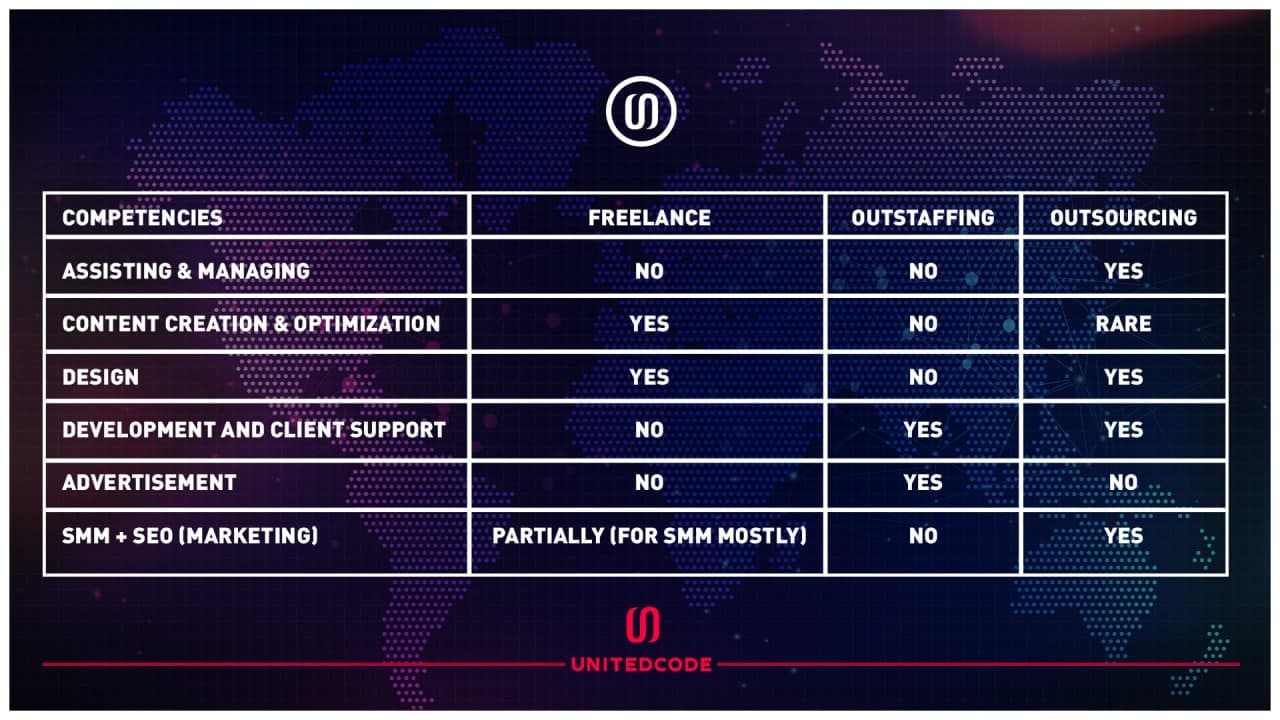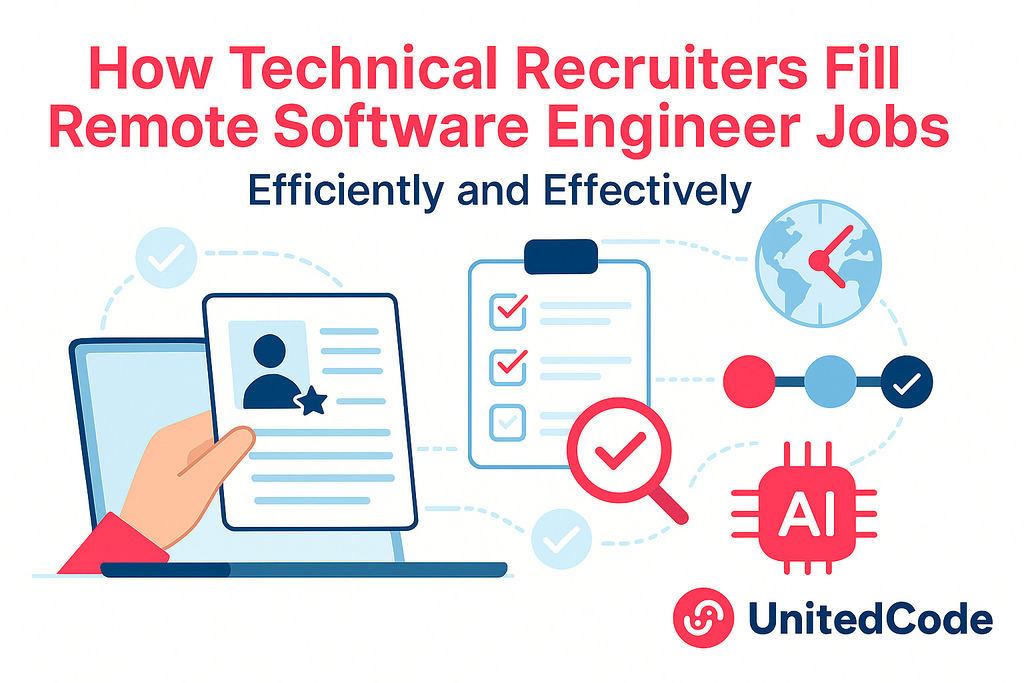According to the official statistics, the quick growth of freelancing jobs around the world is staggering: only in the United States, freelancers constitute more than 35% of all employees, and altogether, they earn up to one trillion dollars per year.
Taking into account this information dates back to 2016, you can imagine the numbers today. By 2021, this type of work is forecasted to achieve a mark of 43%. In 2030, it may reach 80%! Such numbers are mostly explained by the lack of desire to attend physical office and be controlled all the time.
At the same time, the outsourcing market is expanding with the speed of light as well. It became possible thanks to the specialists from Eastern Europe. Here, most of the known and small US businesses hire a workforce to complete both core and non-core activities and responsibilities. In addition to these two, outstaffing is one more phenomenon that is gaining popularity among startups and large enterprises.
The dilemma is which of these three to pick? The point is all three have their pros and cons, but the pros are more obvious. In this article, we will try to figure out which is the best option for your business and have a closer look at each of these types of recruiting.
Definitions of Outsourcing, Outstaffing, and Freelance
Modern technologies make it possible for people to fulfill their job responsibilities without even going to the office. Working distantly allows saving plenty of time that one would waste on going to the office. It will also save costs on transportation. However, the question is which of the new approaches to hiring staff works best of all and when. We should first define each term properly.
Freelancing stands for hiring a private expert who can cooperate directly with more than one client. It is the so-called “flying solo.” Such a specialist can choose working time and location. That is the top option for young people who are still distracted by education and other duties. It is possible to process orders without leaving home, rent a room/office, work at night or day, and, what is more important, earn money around the world by being in one particular point. Only knowledge of language matters. At the same time, it might be difficult for some people, especially students, to organize their schedules and catch up with all deadlines. Some just get lazy, having no control and feeling of responsibility. Often, such specialists choose project jobs, and there is no guarantee of a stable income.
Outstaffing refers to recruiting the remote expert who would agree to be fixed in the staff and work full-time. The only difference is that he or she will not have to attend physical office every day. Long live the Internet! The schedule of a remote employee, as well as the salary, is fixed. Selecting a workplace at your discretion is always a great plus, but, in most cases, such workers have to attend office several times per month. In addition, outstaffing is the way to reduce the taxes you pay. If a business hires a specialist in its own country, one has to cover the corresponding taxes. Also, the process of firing gets way easier when dealing with outstaffed employees.
Outsourcing… So, we have come to another interesting, safe, and beneficial approach to hiring staff today. If one deals with a freelancer, there is no guarantee that everything will be done accurately and on time as most freelancers do not sign any contracts: a company cannot control the work of such people. Speaking about outstaffing, it might be difficult to train the employee who is not attending physical office even though it is a great alternative too. As for outsourcing, it is the process of recruiting field experts using a third-party, outsourcing agency. It becomes the agency’s duty to find, select, hire, train, and retain personnel. Basically, the client has to do nothing except for providing the project details and pay for the services.
So, these are the basic definitions of different modern approaches to hiring staff. Then, we should compare them with each other to help you make the right choice.
The next stage in identifying the best approach to your business is finding the differences between all three hiring methods. First of all, freelancers are self-employed specialists. In the case of two other approaches, there are people like hiring managers or other representatives of the organization that chooses candidates and give them a job. It guarantees a certain level of professionalism of the hired units.
Second, the difference in schedules is also noticeable. Freelancers may work at any time of day or night. Remote workers work the same hours as the rest of the company, and they are hired full-time. Sometimes, in case of outstaffing, the sides can negotiate the working hours. Anyway, it is a company’s FULL-TIME employee who could be a system administrator or even a manager, and if a company is interested in investing time and effort in developing one strong expert to serve for a long, it is the right choice. Usually, it takes up to half a year to do so. As for the people who work via an outsourcing agency, they should obey the rules of the agency’s client. They may have to work at night or by shifts. The schedule depends on the client completely. It could be both, full-time or part-time involvement, or a project job. In many cases, building an outsourced team, it may take from 6 months to one year.
Third, freelancers usually deal with more creative activities than outsourced or outstaffed guys. Those are usually copywriters, designers, illustrators, translators, book authors, etc. In the case of outstaffing, those are typical office workers who usually complete routine daily things. In the case of outsourcing, such specialists as web and software developers as well as customer support reps and data analysts are most often associated with this term.
Freelancers are usually way cheaper to hire than remote employees or outsourced teams. For example, you can always find a freelance English copywriter from India to cut labor costs. However, you should not expect that the quality of the articles will be the highest as those are not native speakers. Moreover, freelancers are often students who lack experience in certain fields as well as necessary skills. In the case of outstaffing, the company alone is responsible for who it hires. Some candidates show their worst qualities only over time, but it rarely happens. Thus, outsourcing might be the most expensive option, but it still cuts operational and labor costs significantly.
Finally, we should stress guarantees. The most reliable approach to hiring is, no doubt, outsourcing, but outstaffing is quite secure and credible too. An outstaffed worker usually passes severe selection and preparation stage, so the quality of their job is corresponding. When it comes to online security and data safety, outsourcing is a great option as your business deals with field experts checked by the outsourcing agency and tested by time. Moreover, a good outsourcing agency must possess all quality certificates like ISO and sign documents like NDA to make you sleep well at night knowing that the work is done properly and timely, and your business information along with the personal details remain safe and confidential. If the agency wants to share the case of your business as an example of a success story, it will always ask for permission.
Those are the basic differences between all three. Hopefully, you can get the point even better from the table below. It explains the differences based on various business activities.

Anyway, the major similarity is an opportunity to cut costs. While a remote worker or freelancer should get all the necessary resources for work on their own, in case of outsourcing, the hiring agency will provide the team created for your business with everything necessary. Once again, outsourcing might require a bit higher investment than two other options, but it offers more guarantees. At the same time, this approach is recommended for short-time projects where project accomplishment matters more than the role of a particular member. As for outstaffing, it is a perfect option for those who would like to hire a specialist for long-term projects and further professional development. Thus, we can say that outsourcing and outstaffing are both effective approaches to recruiting staff if you want to grow your business quickly with the minimum of investments. Below, we will discuss some of the major points you should keep in mind while choosing a freelancer or outsourcing service.
So, you are sitting there thinking about hiring a copywriter, designer, legal expert, IT pro, or programmer for your business. If you need one just for a project work that is not highly responsible and has flexible deadlines, you can think about hiring a freelancer. However, the competition on all websites offering freelancing services is rather high. You should pick carefully out of thousands of options. It is not enough just to observe the profile of a writer. Here are the steps that will give you a clue!
How to Pick a Freelancer Smartly
- Check out how many current projects a person of your interest has. It is not a good idea to select a freelancer with many projects at a time.
- Viewfeedback left on various freelance platforms.
- Find out whether any additional contacts are available in case of force majeure.
- Make sure you have several communication channels available (e.g., phone, messengers, email, etc.)
- Ask the person to provide their passport details or other identification docs.
- Explore the freelancer’s LinkedIn profile (if any).
- Agree on the specific time of your calls or other types of interaction.
- Discuss and fix the penalties for cases when a freelancer misses the deadline or provides low quality.
- Specify the payment methods and other financial details. Prepare at least some official documents for signing.

The rules for picking an outsourcing company are a bit different. Usually, businesses turn to outsourcing companies to hire full teams instead of an individual. That is far more responsible, and that is why you should follow our recommendations strictly.
Selecting a Reliable Outsourcing Agency
- Find out the areas of expertise. Some of the companies are only experts in a specific niche. It is impossible to be Jack of all trades.
- Listen more, talk less. Find out who the clients of the service are, who is its CEO, what are the specific achievements, etc.
- Find and check out the CEO’s profile on LinkedIn. Such professionals MUST have a LinkedIn page!
- Always sign NDA and similar documents! While doing that, learn more about the company’s clients and issues they face as well as the pros and cons of working with other businesses to find out whether they really keep everything in secret.
- Try to learn more about the company’s approaches to work and methods.
- Always keep in touch with several vendors at a time.
- Check out Clutch, Fiverr, TimeDoctor, Feedough, and similar services to discover what other people and experts say about the company.
- Ask how many in-house employees they have.
- Ask how long it might take to find experts in the field of your interest.
- Ask how the company assesses its workers. Check out the LinkedIn profiles of the specialists the agency hires for you.
Those are the main rules to remember. We still have something to add. Concerning point 8, you should find out how many programming and HR specialists are working in the company. You may also wonder about the level of English or other languages that your business uses. Will you have access to programmers at any time? Ask how many projects are currently carried out by the agency and think logically about whether they will be able to complete your project within the set timeframe at the expected level. Do not choose companies with a huge workload, even if they promise to catch up with all deadlines with no harm to quality.
Also, we believe that you are interested in a relatively fast scale-up. It makes sense because, as soon as you build the right team, you will start earning the profits that you plan to achieve. On average, it takes up to three weeks to come up with a team for business. You may also view the office’s photos and evaluate the approach in general. Good outsourcing firms always have separate cafeterias, restrooms, gaming zones, and more.
That is what you should know about the differences between outsourcing, outstaffing, and freelance. Even though we recommend choosing outsourcing or outstaffing to everyone (from small startups to big enterprises), it is up to you to make the final decision. The choice depends on your specific needs and areas of expertise. Evaluate your business goals and budget, and take one step closer to the success and prosperity of your business!




